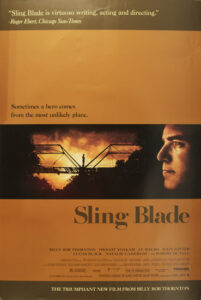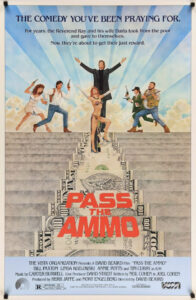calsfoundation@cals.org
Oscars for Arkansas?
The recent Academy Awards celebration put me in mind of the many movies filmed in—or made about—Arkansas, if only because while the state has sent forth a number of talented people who have been nominated for—and won—Oscars, the state itself has generally not been significantly represented on Oscar night.
 Billy Bob Thornton received an Oscar for Sling Blade, filmed and set in central Arkansas, and John Wayne received one in 1970 for his role in 1969’s True Grit, a film that at least started out in Fort Smith, even if it went west from there.
Billy Bob Thornton received an Oscar for Sling Blade, filmed and set in central Arkansas, and John Wayne received one in 1970 for his role in 1969’s True Grit, a film that at least started out in Fort Smith, even if it went west from there.
Also worth noting: Newport (Jackson County) native Mary Steenburgen won an Academy Award for her supporting role in the 1980 comedy Melvin and Howard, and Max Aronson of Pine Bluff (Jefferson County), better known as Gilbert M. “Broncho Billy” Anderson, received an honorary Oscar in 1958. King Vidor, director of Hallelujah (1929), one of the earliest Hollywood feature films shot on location in Arkansas and one of the first Hollywood pictures with an exclusively African American cast, was nominated for Best Director for that film in 1930. Lisa Blount received, with husband Ray McKinnon, an Oscar for the 2002 short film The Accountant.
And some Arkansas films at least had the honor of being nominated. Although coy about its Arkansas connections (being based loosely upon the 1992 presidential campaign of Bill Clinton), the film Primary Colors received two Academy Award nominations. Clinton also looms large in The War Room, a documentary about his presidential campaign that was nominated for Best Documentary. Brubaker, loosely based on the controversial 1969 nonfiction book Accomplices to the Crime: The Arkansas Prison Scandal by Joe Hyams and prison warden Thomas O. Murton about abuse in the Arkansas prison system, received a nomination for Best Screenplay. Unlike both of these films, the movie A Soldier’s Story was actually filmed entirely in Arkansas and received three Academy Award nominations. There was early discussion among critics that the 2018 film Boy Erased, based upon a memoir by Garrard Conley (who grew up in northern Arkansas), might be recognized by the Academy in 2019, but it didn’t make the cut.

Granted, there are plenty of Arkansas films that were never made with a thought of competing at the Oscars, such as the Roger Corman movies Bloody Mama, Boxcar Bertha, and Fighting Mad, though the last two helped to launch the careers of their directors, Martin Scorsese and Jonathan Demme, respectively, who went on to take that statuette home.
And we can also forgive the Academy for overlooking The Day It Came to Earth, Pass the Ammo, and The White River Kid. But the real snub was A Face in the Crowd. If ever the Academy decides to institute a “Best Picture We Overlooked at the Time” category, this one will take it home for sure.
The 2020 movie Minari, set in northwestern Arkansas but actually filmed in Oklahoma, received six Academy Award nominations in 2021 and won one—the award for Best Supporting Actress, won by Yuh-Jung Youn, the first Korean ever to receive the award.
For the 2024 Academy Awards, the film The Barber of Little Rock was nominated for Best Documentary Short Film (although it lost out to The Last Repair Shop). The documentary, directed by John Hoffman and Christine Turner, addresses the wealth gap between races.
By Guy Lancaster, editor of the CALS Encyclopedia of Arkansas




